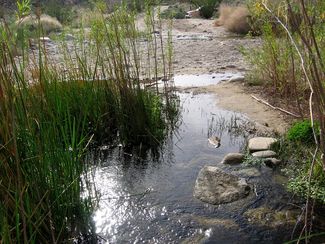Water Overdraft Requires Community Action
Last updated 8/21/2016 at 4:01am
If you've been following any of the recent articles in the Borrego Sun and elsewhere regarding California's water shortage and the new State law striving to address the issue, you've heard of SGMA (pronounced 'sigma'). But what exactly is it?
The Sustainable Groundwater Management Act of 2014 (SGMA) requires all basins of the State in a groundwater overdraft condition (groundwater extractions are greater than natural recharge) to achieve sustainability by the year 2040. Sustainability means the amount being used equals the amount being naturally recharged. Each basin in overdraft is required to adopt a Groundwater Sustainability Plan (GSP) to address how it will reach sustainability by 2040 and submit the plan to the State for review.
If a community fails to act, the State will take charge of the basin to establish sustainability. Both the Borrego Water District (BWD) and the County of San Diego have filed requests with the State Department of Water Resources to become a Groundwater Sustainability Agency (GSA) for the Borrego basin. BWD and the County are currently working on a Memorandum of Understanding so that they may share the responsibility of creating a GSP. A key element will be stakeholder participation and input. Once the GSP is developed, it must be approved by the BWD Board and the County Board of Supervisors, then by the State Department of Water Resources. The deadline is January 2020.
How will this affect our water rates? They already have, per BWD's action in June, and will continue to do so. Compliance with SGMA and development of a GSP will cost money. However, the course BWD is pursuing, working with the County as joint GSAs toward a local solution, is the least expensive alternative. If we do nothing, a recent US Geological Survey Report estimates our uppermost, and most prolific of three aquifers, will be depleted in approximately fifty years at the present rate of extraction. While water remains available below the upper aquifer, the cost of extraction would rise significantly. Furthermore, if a GSP has not been approved by 2020 and the State takes charge of the basin, the outcome would likely be 'top down' and regulatory, potentially increasing the cost beyond what locals would be able to accomplish on their own.

Another alternative, adjudication, would ask the courts to determine who has rights to pump a specific amount of water when there is a dispute. This would add attorney fees to the existing costs associated with SGMA, and to date, no adjudications in Southern California have actually accomplished the purpose of SGMA – to create a sustainable use of the basin by bringing it into balance.
Your input is important in this process! If you're not already involved, you can begin by becoming informed. Attend BWD meetings and visit their website (www. borregowd.org). Once BWD and the County are approved as GSAs, they will establish an advisory committee of approximately nine representatives from various community sectors who will provide technical and informational assistance to the GSAs. Each advisory committee representative will be required to serve in a leadership role to provide stakeholder input from the sector's members to the GSAs and accurately relay information and requests from the GSAs to the community. It is contemplated that one of these representatives will represent the BWD ratepayers. If this community is to successfully address the overdraft, it is up to us to control our own destiny and ensure water for the future by participating in the process.
See SGMA Q&A for further information



